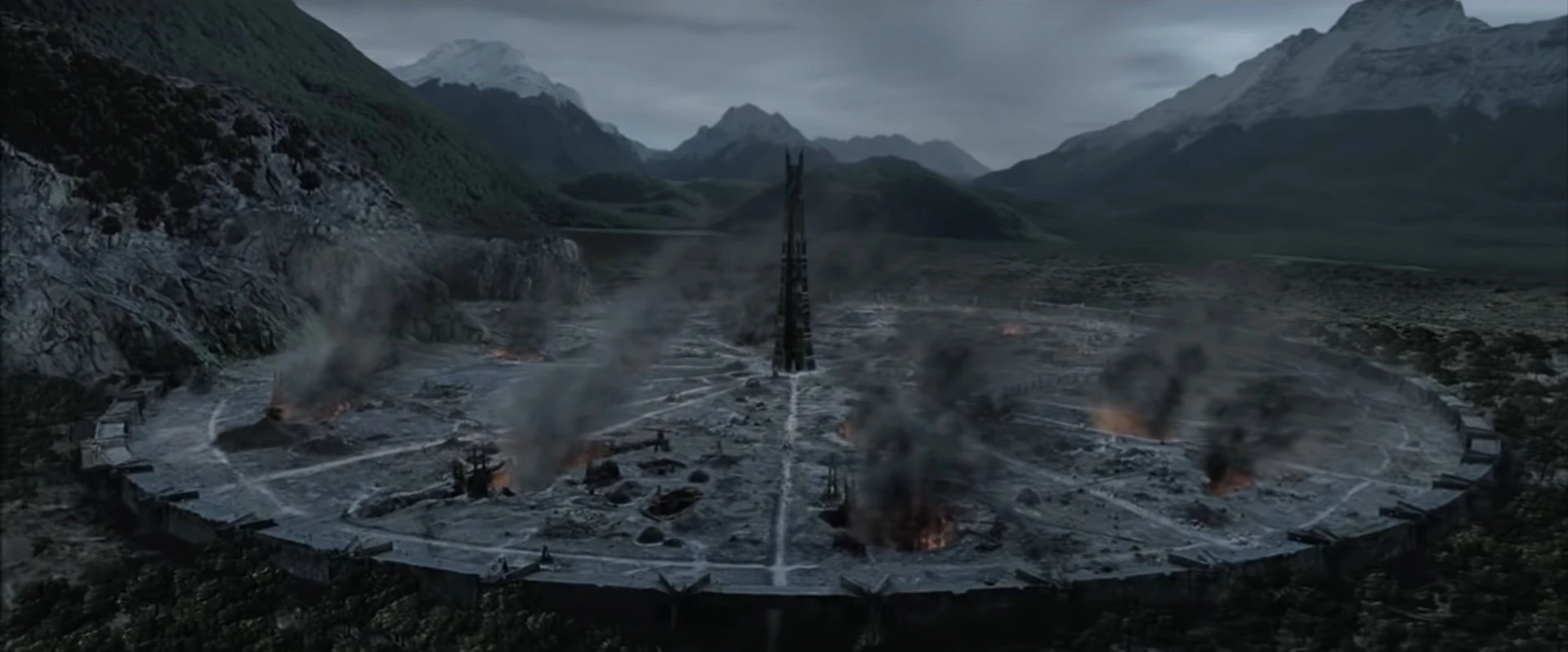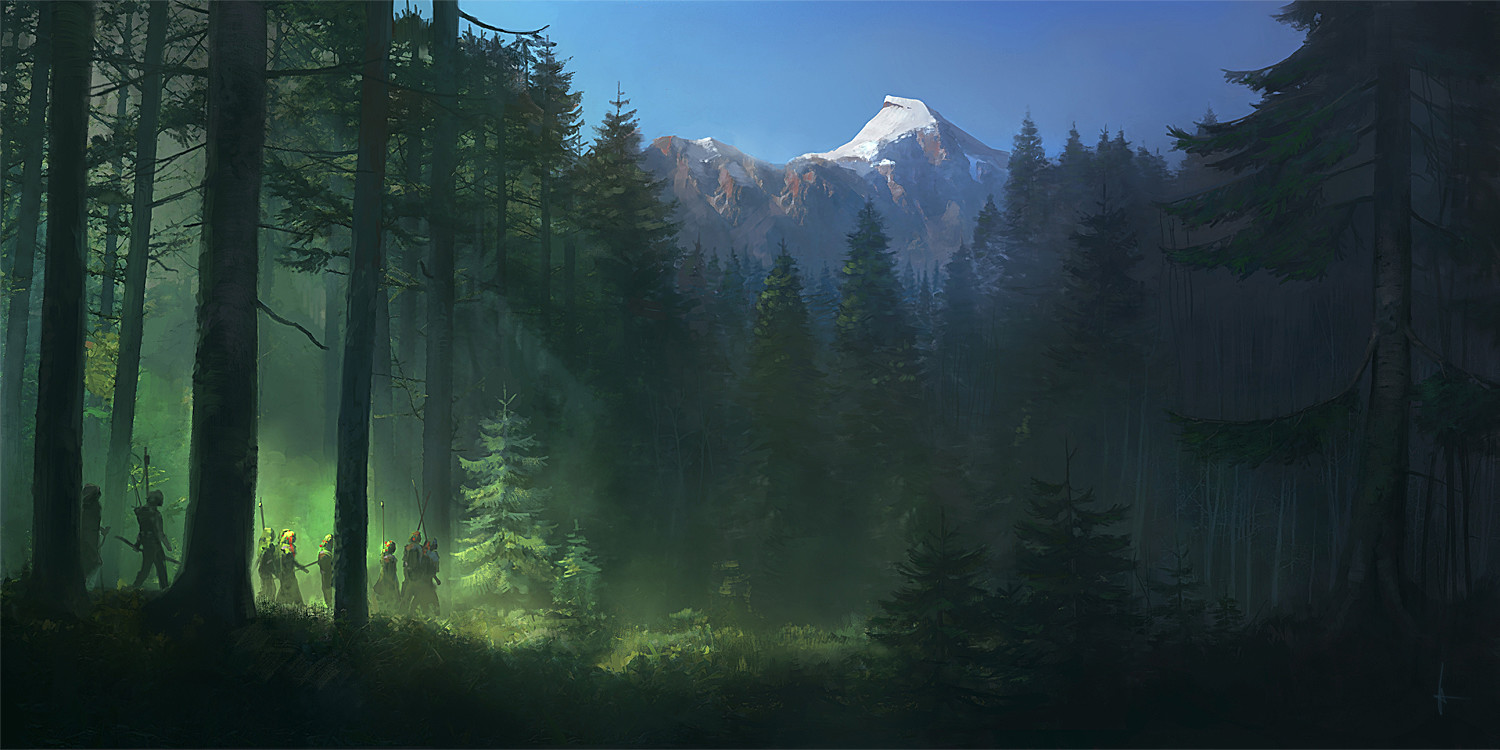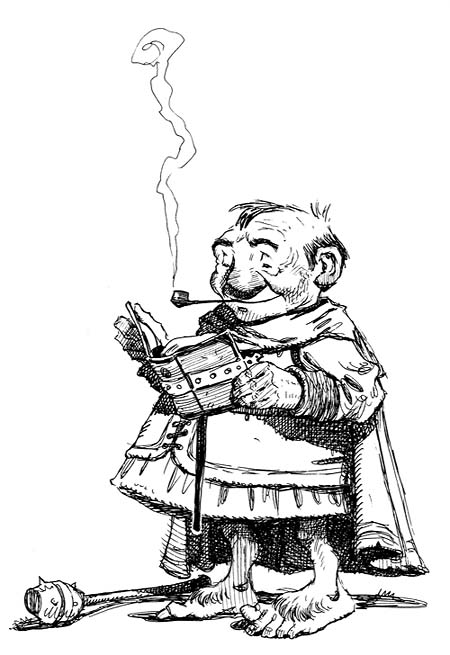This year, I participated in the OSR discord's Secret Santicorn. The basic idea is that you submit a concept you want someone else to make a blog post about, and then you get someone else's concept and have to make a post about it. Here's the prompt I had:
Mechanisms for reinforcing themes in OSR games. I've got a number of ways I do this myself, but I'm curious about other takes. How would you make OSR mechanics that emphasize loneliness, for example? Or romance? Or revenge? Keep in mind, these are mechanisms to be used in existing games, not new games in and of themselves!
Let's see how well I can stick to that idea (Hint: not very)
Themes in OSR
So what are themes, anyways? My completely amateur understanding
(gathered from here) is that a theme is an underlying message in a work. Lord of the Rings is about a group of friends trying to stop the end of the world, but it's also about power and how it can corrupt others, death, and industrialization (just to name a few).
 |
| It's no coincidence that the bad guys are the ones chopping down trees and making technology. |
With that in mind, how do tabletop games have themes? It makes sense to have them in a movie or book, since those all (typically) have entire arcs and conclusions in mind before they reach the general masses. But in tabletop games it's
you and everyone else at the table that's in charge of where the story goes. Not to mention that the story can go in all sorts of wild directions depending on a million and one factors! All that being said, however, tabletop games have some tricks up their sleeves to guide players into messing around with the stuff designers wanted their players to think about. One trick is
mechanics.
Take Vampire: The Masquerade 5th Edition for example. In this system, you play as a vampire (un)living in the modern day. You have super strength, fast reflexes, and weird specific quirks and abilities you pick up depending on what type of vampire you are, but the life of an undead monster comes with some rough costs: there is an ever-constant hunger that gnaws at you in every waking hour. A beast inside you is just itching for a taste of that sweet, sweet lifeblood that is in every human you'll pass by on the street when you're out doing urban vampire jobs. Whenever you start a session, you'll roll a check to see if that hunger increases. The interesting twist to this mechanic is that you
start the game already hungry, and it can only go down
if you kill someone.
So what does this do to the game and how it's played? For one, it reinforces the theme that while it's cool to have vampire powers, being an undead monster that preys on humans for survival will make your character, well, a monster. You can mitigate it by feeding on blood bags, but they taste bland and you might not even get any satisfaction from it if you're an older vampire. You could have a consensual agreement with someone(s) to feed off them, but then you risk exposing the existence of your kind to the world, which in vampire society is considered "a dick move". You could just straight up ignore it, but sooner or later the hunger grows, and when it reaches a certain point you revert back to a primal beast, attacking the nearest source of Human Wine you can find.
The developers
want you to consider the fucked up stuff your character is doing to survive, as another mechanic in the game (Touchstones) force you to make a set of morals and human characters that you give a shit about. Do you selfishly feed on the unsuspected to protect your secret? Is it even selfish to want to hide that, as the knowledge of your existence could be life or death for not just you, but vampires as a whole? And, if you take it even further,
would vampires going extinct even be a bad thing? Mankind is doing quite a number on our surroundings with all the pollution, littering, and infrastructure we're setting up around the whole world, but you still breathe, you still shop, and you still gotta drive to your 9 to 5 job. What's a few humans getting a bite they won't even remember or even register as painful to getting to wake up the next night, and the night after that, and on and on?
The moral dilemma of being a human turned monster is a core theme of V:tM 5e, and the Hunger mechanic reinforces it by having you juggle your character's morals with the constant demands of their inner beast.
Kinda fucked up, ain't it? So, how do you set up mechanics to reinforce themes? That's a good question, and one that I don't really have the answer to because I am but a ye olde novice of the trade. But, I have at least a suggestion!
The 5 Point Scale
The basis of this mechanic is largely influenced by a whole jumble of different mechanics from different games, but the launching pad for it is mostly DnD 5e's optional Loyalty rules for NPCs.
For this 5 Point Scale, you have 5 boxes jotted somewhere in a row on your character sheet. As your character works toward a thematic goal, you move up and down the scale in accordance to the theme and the step your character is currently on.
The Movie Example
I'm gonna use Lord of the Rings again because you've most likely seen it. For this scale, let's set up a theme of
Power and how it corrupts. In this example, I'll be playing Frodo Baggins, sidekick of the story's actual hero Samwise Gamgee. My DM says the story is about destroying a powerful magic item that can doom the world? Sounds good, considering my dude just wants to smoke pipeweed and play Xbox until the end of his days. On one end I jot down "Innocent joe schmoe" and on the other I write "Corrupted". With that out of the way, we're off to the races as my character and my good friend Samwise make way for the Prancing Pony tavern!
At said tavern, I stumble and the magic ring flies out of my hands. Reaching out, it accidentally slips onto my finger and I get the first taste of its true power. Holy shit, it makes me invisible! And I can see weird wispy mist?
Wait, isn't this the same ring from the other hobbit-based game the DM ran a while back? Cool! In fact, it's almost a little
too cool. Not cool enough to make me go all Bad Guy, but enough to make me consider maybe
purposefully putting on the ring in the future. I know it's evil, but it lets me go invisible! I mark off one box on the "Innocent joe schmoe" side of the row and keep playing.
Flash forward to the end of the game, we're at the mountain I gotta drop the ring into. So close! And yet, so far... I mean, why
should I toss it into the fire? It's dope! And it makes me invisible! My friend Samwise pleads for me to toss it, and the logical part of my brain is screaming "Yes! Cast it into the fires!"... but power corrupts, and I'm 4 boxes deep into this mess. I make a save... and fail. Oops, sorry Samwise, I'm hopping outta here
with the ring and y'all can get fucked. I check off the final box, and I have completed my corruption. Yippee!
The Tabletop Example
For example, let's say that one of the character's/campaign's themes is
Revenge. In this example, you're playing a character that has recently been slighted by an NPC - let's say a local Baron named von Badguy. You and your DM agree to use this 5 point scale
because I've bribed you, and you set up the 5 boxes on your sheet. You label one end "Beginning" and the other end "Revenge!" Since this vendetta is new, you mark off one box near "Beginning".
Throughout the following sessions, the DM provides a chance for von Badguy to get the short end of the stick. Maybe you're in a granary owned by the baron and are given the chance to mess up his profits or make him look like a careless owner. One sabotage scene later, the granary is set to start spitting out bad yields (I don't know how granaries work, I chose poorly for this example). Word spreads and the baron has to save face. Depending on how bad you wanna mess von Badguy over, the DM will ask you to mark off a number of boxes equal to how satisfied your character is with that sabotage being the full of their revenge.
As you move closer to the other end of the row, it becomes harder and harder to ignore your lust for the baron's comeuppance. At 3+ boxes marked off, you have to make a Willpower/Mental/Wisdom/etc roll to fight back the urge for revenge even at the most inopportune times. Sure it's easy to brush off the thought of cutting all the roses in his garden off when you're supposed to be sneaking around his mansion, but this is the same man that slighted you once so long ago - fuck him! Ideally a roll will only be required in situations where answering the inner beast's call for revenge can lead to interesting scenarios, such as having you expose your presence in the gardens to a patrolling guard, or alerting the guard to intruders when he stumbles upon a dozen freshly cut roses on the garden grounds.
Once you have checked off all boxes your revenge is considered complete. You have ruined this man to the extent you wished for and can die a happy adventurer. Wipe the slate clean and see if there's another desire you can put in the 5 point scale in its place!
This method can also be reversed, where you go
down from a full row of marks to none at all. For this example, let's say the character's/campaign's theme is
Loneliness. You're playing a hermit that doesn't get along well with others, or feels like they don't in some way. You set up your row and fill in all 5 boxes, labeling one end "Content" and the other end "Lonely". When you're in a depressed, lonely state, it's hard to come out of it, especially in the beginning.
The Willpower/Mental/Whatever mechanic stays the same, but now is called when you run into a mixed bag situation that your character could take the wrong way. Did you get downed in a fight alongside another character and the healer picked the other guy to patch up first? Maybe the loot was unevenly split, maybe not even on purpose! It's hard to take people at their face value when they say they care for you when you've conditioned yourself to only depend on yourself, and so it's in turn harder to get rid of those bad habits that keep whispering "Do they really care, though?"
Hell, the loneliness example works even if you're the only character around. Playing a post-apocalypse survivor with a haunted past? Maybe the family photo you ran into in that house you just searched brings up painful memories, memories that can only be pushed back with brown liquid in a clear bottle.
TL;DR
1. Establish a theme with the DM that your character will reasonably interact with consistently enough for it to matter
2. Jot down 5 boxes in a row somewhere on your character sheet
3. Label one end the desired end result (Revenge, Contentness, a Full Stomach) and the other end "Beginning" or something else that lets you know where to start.
4. As you go through the game and interact with these themes, mark off a box (or erase a mark if working backwards) for each decision or scene that reinforces the theme somehow
5. As you get closer to the other end of the row, mental fortitude checks are needed to push on towards the resolution of said theme
6. Once you've reached the other end, you've completed the thematic arc! Erase it all and start with another theme
Ideally, the DM and player(s) discuss potential consequences/rewards that accompany having a high revenge/loneliness/blah blah, but I've already written more than I thought I could manage so that's a story for another time.
This is a pretty messy system, and can get a little complicated, but I hope there's some leeway for it being the first mechanic that I've really written down - and for having only about a week to get it done! Do you have another way to reinforce themes through mechanics? I would love to hear them, cause making this one was pretty fun.










